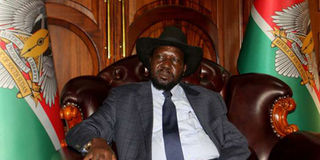S. Sudan lawmakers change constitution to give Kiir more powers

South Sudan President Salva Kiir. A United States senator engaged in an unusual public display of anger and frustration at a session on December 10, 2015 focused on the continued fighting in South Sudan. FILE PHOTO | AFP
What you need to know:
- The constitutional change comes after President Salva Kiir ordered the number of regional states to be nearly tripled, undermining a fundamental pillar of a power-sharing deal to end a nearly two-year long civil war.
JUBA
South Sudan’s parliament has changed the constitution to boost presidential powers amid fears violence is spreading to new areas, with seven killed on the highway to Uganda.
The constitutional change comes after President Salva Kiir ordered the number of regional states to be nearly tripled, undermining a fundamental pillar of a power-sharing deal to end a nearly two-year long civil war.
“This amendment is actually paving the way for the introduction of the new states,” Information Minister Michael Makuei said.
The creation of new states threatens to undermine a complex power-sharing formula, the basis of the peace deal, to forge a transitional government.
But lawmakers also voted in support of the August peace deal, despite both army and rebels repeatedly accusing each other of breaking the eighth such agreement.
The civil war began in December 2013 when President Salva Kiir accused his former deputy Riek Machar of planning a coup, setting off a cycle of retaliatory killings that have split the poverty-stricken, landlocked country along ethnic lines.
On Thursday morning, gunmen ambushed a bus and four lorries on the highway to Uganda, 130 kilometres south of Juba.
“A bus four lorries were attacked... three passengers and four drivers were killed,” said Eastern Equatoria information minister Mark Akio.
The worst of the fighting has been concentrated in three states — Unity and Upper Nile in the north, and Jonglei in the east, often pitting Dinka and Nuer ethnic groups.





